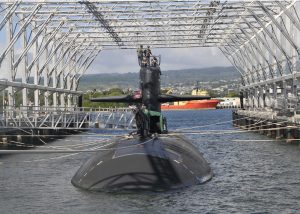As experts in Tokyo hotly debate AUKUS, the new security partnership of the U.S., the U.K. and Australia, Japan’s response, while generally welcoming, appears to have been rather ambivalent.
On the one hand, AUKUS demonstrates that the United States is stepping up its efforts to compete with China’s growing naval capability. The new framework is also set to increase Australia’s commitment to peace and security in the Indo-Pacific region, something to be wholeheartedly welcomed by Tokyo. Australian nuclear submarines, most probably in a highly integrated manner with the U.S., will be patrolling the South China Sea, helping the U.S. maintain the undersea balance of power vis-à-vis China. This will create more opportunities for Tokyo to cooperate with Australia.
Another noteworthy aspect of AUKUS is that it will consolidate and strengthen the U.K.’s engagement in the Indo-Pacific region, not only via its involvement in the building of Australian submarines, but also through more frequent deployments of its nuclear submarines to the region, possibly using Australia as a forward base. Tokyo has been strengthening defense ties with the U.K. and has supported London’s engagement in the Indo-Pacific, as demonstrated by a series of joint training and exercises during the deployment of the U.K.-led carrier strike group (CSG21) in the region.
There are therefore good reasons for Tokyo to be happy about the announcement of AUKUS. It is hardly surprising, then, that government officials in Tokyo have welcomed AUKUS.
However, it is important to note that Tokyo has not welcomed the nuclear submarine deal per se. Indeed, Japan’s embrace of AUKUS seems to be half-hearted at best.
In a press conference, Foreign Minister Motegi Toshimitsu said that the government “welcomes the launch of AUKUS in the sense of strengthening engagement [of those countries] in the Indo-Pacific region.” What this suggests is that the object of Tokyo’s welcome is limited to the fact that the U.S., the U.K. and Australia are set to strengthen their engagement in the region, without referring to nuclear submarines. Herein lies Tokyo’s sense of uneasiness and discomfort regarding AUKUS.
First, the use of nuclear propulsion for military vessels remains controversial in Japan. The announcement of AUKUS has already prompted discussion on the pros and cons of Japan’s possessing nuclear submarines. During the leadership contest of the ruling Liberal Democratic Party (LDP) in September 2021, while two of the four candidates expressed support for the idea of having nuclear submarines, Kishida Fumio, the winner and the current prime minister, was among those who expressed skepticism. It is highly unlikely that Tokyo will be making its own decision to pursue nuclear submarines anytime soon, even after Kishida’s tenure.
To begin with, whether Tokyo needs nuclear submarines in military terms depends on what role it wants to play. If the country is committed to expanding its operation in the South China Sea and beyond, having nuclear submarines could make military sense. Yet, as long as the focus is on patrolling the East China Sea – shallow water and closer to the main islands of Japan – the current diesel-electronic submarines are better suited.
Second, even assuming that Tokyo could make up its mind and pursue nuclear submarines, it is far from clear whether the U.S. would agree to help. In announcing AUKUS, the Biden administration has emphasized that it is a “one-off” deal, uniquely available to a special ally such as Australia, a country with which the U.S. and the U.K. have been fighting alongside for more than 100 years. The only other case of America’s sharing of nuclear submarine technology is with the U.K. It is no coincidence that the three allies of AUKUS are the core of the already exclusive Anglo-Saxon intelligence-sharing framework of the Five Eyes.
Despite the fact that intelligence cooperation between the United States and Japan has developed over the years, particularly regarding China and other related issues in the Indo-Pacific, the overall level of trust in the intelligence domain is still said to be inadequate. AUKUS has made this reality visible yet again. Fully aware of this, there is a sense of detachment regarding AUKUS in the foreign and security policy community in Japan.
Third, there is the question about the degree to which Tokyo would be willing to integrate its submarine operations with that of the U.S. This is a question of sovereignty and freedom of action. At the same time, there are legal restrictions in Japan as well. Though the details have not been sorted out yet, Australia’s nuclear submarine operation is likely to be highly integrated with that of the U.S. in the South China Sea and beyond. This prospect, while encouraging in view of maintaining the undersea balance of power vis-à-vis China, could end up diminishing Japan’s role, at least in relative terms, in the U.S. strategy and operations in the region, which some Japanese could feel uncomfortable.
The emergence of AUKUS as a new pillar of U.S. engagement in the region will force Tokyo to consider how it could deepen its alliance with Washington. The degree to which it is willing to integrate with the U.S. in military terms is something Tokyo will have to contemplate after the election and in the run-up to the revision of its national security strategy, expected in 2022.
































